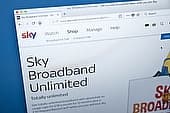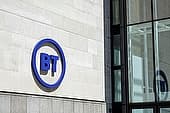Home > Broadband > News > Broadband for all is here - and has been for a while
Broadband for all is here - and has been for a while
LOTS of things happen over Christmas without us really noticing, like our clothes shrinking so we don't fit in them come January - and everyone in the UK suddenly being guaranteed broadband of at least 2Mb.

The surprise gift is the result of the Government's decision in early December to start offering subsidies for connection to satellite broadband for those in the least connected areas.
As Digital Economy Minister Ed Vaizey put it, the scheme "offers immediate assistance to those homes and businesses in the most remote areas with the slowest speeds."
It also means that the Government have been able to claim that everyone in the UK is now capable of accessing better than basic broadband - just in time to meet their own deadline.
Not superfast
It's worth noting that this scheme doesn't detract from the Government's much greater ambition of having superfast broadband available to 95% of the UK by 2017.
The Government are very happy with the progress Broadband Delivery UK (BDUK) are making on that front, saying that more than 3.5 million homes and businesses have now been given access to superfast broadband.
That means they should pass at least four million premises by some point during spring this year; this time last year it was expected that they'd hit the four million mark by June 2016 - six months ahead of the official schedule.
But while the superfast rollout is going according to plan, the introduction of the satellite subsidy could be taken as a sign that efforts to improve basic broadband have stalled.
Shifting deadlines
The superfast network built by BT
When can we expect 100Mb broadband?
Rural broadband - the options
It was back in 2009 that the Government's Digital Britain Report introduced the idea of a Universal Service Commitment (USC) of 2Mb for all UK households; that was originally supposed to be achieved by 2012.
The deadline was extended to the end of 2015 - although the end of 2016 has also been mentioned occasionally, most notably in Defra's report from this time last year, in which they called for the USC to be raised to 10Mb.
While the number of premises unable to get up to 2Mb broadband has decreased - from 3% nationally in 2014 to 2% this year (rising to 9% in rural areas) - the rate at which access and connections were improving meant neither the 2015 nor the 2016 targets were likely to be met.
So in September last year the Government started running two pilots for the subsidy scheme in West Yorkshire and Suffolk, before rolling out the full version nationwide last month.
Accessible versus attractive
Of course, the UK has had satellite broadband for some time; BT pointed out to Defra [pdf] back in 2014 that "the commercial availability of satellite broadband means that everyone now has access to 2Mb".
That, they said, was enough to lead the European Commission to "declare [the 2Mb] mission accomplished".
What has changed is that the Government have made an effort to make satellite a more realistic option for those without decent fixed line services.
Compared to getting broadband piped in through the cables and wires that already come into our homes, satellite broadband is slower to respond, requires more kit - and is much more expensive considering the level of service we get.
According to one of the local authorities running the scheme, basic access shouldn't cost "more than £400 over a 12 month period" - including hardware and installation, activation and monthly charges.
As satellite broadband kit can cost at least £200, and professional installation is usually between £100 and £150, that doesn't leave much for the standard subscription costs.
So the Government have earmarked £15 million to help cover the costs of the hardware and installation, with participants each expected to receive around £350 off their setup costs; anyone taking up the offer must agree to pay the monthly charges themselves.
We're reviewed one of the biggest satellite broadband providers, Tooway; their packages range from just under £20 a month for a 5Mb service with a 2GB data allowance, up to £100 a month for up to 22Mb broadband with 100GB of data.
Having to pay the monthly subscription means users can at least pick which package best suits them - or their wallet - but most can expect to pay at least £24.99 for an up to 22Mb connection with 10GB of data.
That kind of money will buy someone in a more competitive area with a fixed line connection one of the numerous 38Mb fibre packages - and with the right offers, could even get them a 76Mb connection, or faster through Virgin.
It's up to the local authority in each area to decide who is eligible - some are sending out subsidy codes to all those they know are entitled to take part, but anyone who has a slow or non-existent connection can apply.
The funding is strictly limited - if everyone who was entitled took up the offer it would cost the Government roughly £105 million - and if there are plans for a superfast project to reach a property in the near future, it's possible it might be classed as ineligible.
Given that both BT and Openreach have had their knuckles rapped for misleading estimates about when fibre broadband will become available in a particular area, some people could therefore miss out on the stopgap offer.
Fallback position
What's more, now the Government have adopted satellite broadband as a temporary boost for the slowest homes and businesses, there's a risk that they could fall back on it again.
Last year they announced plans to raise the USC to at least 5Mb, and up to 10Mb by 2020 - the speed Ofcom and Defra were both recommending as the minimum for a basic service at the end of 2014.
As satellite broadband is capable of providing up to 22Mb, the danger is that efforts to improve basic broadband services over fixed line connections could be sidelined - just as the European Commission prematurely believed it to be "mission accomplished" regarding 2Mb.
It also does little to improve the range of realistic options for people in more rural locations.
At the moment many are faced with the choice of no or incredibly slow broadband, or satellite broadband; the clear aim here is that before long they'll have the choice of no or incredibly slow broadband, or superfast fibre.
Happus pair with TalkTalk
Compare the best other deals here
How to get a computer cheaply
For all the growing demand for fibre connections, basic broadband still has a crucial place in the market - not just for those who can't access fibre, but for those who can't really afford, or don't want to pay for, a superfast connection.
Then there's the fact that just as with slow ADSL broadband, having superfast infrastructure in place doesn't mean being able to get superfast service - Ofcom say that around two million premises with superfast connections only get speeds of 18Mb on average.
Ironically, the House of Lords said in 2012 that they feared the Government were becoming obsessed by speed, rather than reach - referring as we reported at the time to their determination to get connections of at least 2Mb to every household.
It would be a shame if in the effort to meet their own targets and get something in place for everyone, the Government forgot about making sure those services genuinely deliver, both in terms of speed and price.
Get insider tips and the latest offers in our newsletter

We are independent of all of the products and services we compare.

We order our comparison tables by price or feature and never by referral revenue.

We donate at least 5% of our profits to charity, and we aim to be climate positive.
Get insider tips and the latest offers in our newsletter





